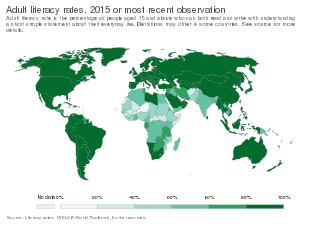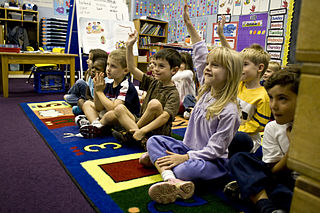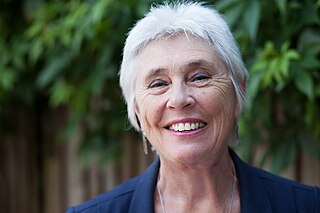
Literacy is the ability to read and write. Some researchers suggest that the study of "literacy" as a concept can be divided into two periods: the period before 1950, when literacy was understood solely as alphabetical literacy ; and the period after 1950, when literacy slowly began to be considered as a wider concept and process, including the social and cultural aspects of reading and writing and functional literacy.

Kindergarten is a preschool educational approach based on playing, singing, practical activities such as drawing, and social interaction as part of the transition from home to school. Such institutions were originally made in the late 18th century in Germany, Bavaria and Alsace to serve children whose parents both worked outside home. The term was coined by German pedagogue Friedrich Fröbel, whose approach globally influenced early-years education. Today, the term is used in many countries to describe a variety of educational institutions and learning spaces for children ranging from two to six years of age, based on a variety of teaching methods.
Education in Scotland is provided in state schools, private schools and by individuals through homeschooling. Mandatory education in Scotland begins for children in Primary 1 (P1) at primary school and ends in Fourth Year (S4) at secondary school. Overall accountability and control of state–education in Scotland rests with the Scottish Government, and is overseen by its executive agency, Education Scotland, with additional responsibility for nursery schools being the joint responsibility of both Education Scotland and the Care Inspectorate. Scotland's private schools are overseen by the Scottish Council of Independent Schools. Children in Scotland sit mandatory National Standardised Assessments in Primary 1 (P1), Primary 4 (P4), Primary 7 (P7) at the end of primary school, and Third Year (S3) in secondary school, which assist in monitoring children's progress and providing diagnostic data information to support teachers' professional judgement.

A preschool, also known as nursery school, pre-primary school, play school or creche, is an educational establishment or learning space offering early childhood education to children before they begin compulsory education at primary school. It may be publicly or privately operated, and may be subsidized from public funds. The typical age range for preschool in most countries is from 2 to 6 years.

Education in Botswana is provided by public schools and private schools. Education in Botswana is governed by the Ministries of Basic Education. and Tertiary, Research Science and Technology Among sub-Saharan African countries, Botswana has one of the highest literacy rates. According to The World Factbook - Central Intelligence Agency as of 2015, 88.5% of the population age 15 and over can read and write in Botswana were respectively literate.

The Child Exploitation and Online Protection Command, or CEOP Command, is a command of the UK's National Crime Agency (NCA), and is tasked to work both nationally and internationally to bring online child sex offenders, including those involved in the production, distribution and viewing of child abuse material, to the UK courts. The centre was formed in April 2006 as the Child Exploitation and Online Protection Centre, and was absorbed into the NCA on 7 October 2013 by the Crime and Courts Act 2013.

Literacy in India is a key for social-economic progress. The 2011 census, indicated a 2001–2011 literacy growth of 97.2%, which is slower than the growth seen during the previous decade. An old analytical 1990 study estimated that it would take until 2060 for India to achieve universal literacy at then-current rate of progress.
Sandra Brown,OBE, is a Scottish campaigner and leading expert on child protection issues. She has also achieved wide recognition as a writer, broadcaster and actress.
The National Literacy Trust is an independent charity based in London, England, that promotes literacy.
The Early Years Foundation Stage (EYFS) is the statutory framework for early years education in England, or, as stated on the UK government website: "The standards that school and childcare providers must meet for the learning, development and care of children from birth to 5". The term was defined in the British government's Childcare Act 2006. The equivalents in Wales and Scotland are the Foundation Phase and the Early Years Framework.

Kathy Hirsh-Pasek is the Stanley and Debra Lefkowitz Professor of Psychology at Temple University in Philadelphia, where she directs the Temple University Infant Language Laboratory. She is the author of 14 books and over 200 publications on early childhood and infant development, with a specialty in language and literacy, and playful learning.
Anne Haas Dyson is a professor at the University of Illinois. Her fields are the study of literacy, pedagogy, and contemporary, diverse childhoods. Using qualitative and sociolinguistic research procedures, Dyson examines the use of written language from children's perspectives within their social worlds, and as they engage with popular culture. Books she has published include The Brothers and Sisters Learn to Write, Popular Literacies in Childhood and School Cultures (2003), Writing Superheroes, Contemporary Childhood, Popular Culture, and Classroom Literacy (1997), Social Worlds of Children Learning to Write in an Urban Primary School (1993), Multiple Worlds of Child Writers: Friends Learning to Write (1989). Dyson has also written articles for professional journals.
Susan Neuman is an educator, researcher, and education policy-maker in early childhood and literacy development. In 2013, she became Professor of Early Childhood and Literacy Education, and Chair of the Department of Teaching and Learning at NYU's Steinhardt School of Culture, Education, and Human Development.
Mary Gordon is a Canadian educator, social entrepreneur, child advocate and parenting expert. She is the founder and president of both Roots of Empathy and Seeds of Empathy, non-profit evidence-based programs dedicated to promoting emotional literacy and empathy among children.
Slow parenting is a parenting style in which few activities are organised for children. Instead, they are allowed to explore the world at their own pace. It is a response to concerted cultivation and the widespread trend for parents to schedule activities and classes after school; to solve problems on behalf of the children, and to buy services from commercial suppliers rather than letting nature take its course.
The Alliance for Childhood is a tax-exempt nonprofit research and advocacy organization founded in February 1999, incorporated in the U.S. state of Maryland, and based in College Park, Maryland. A partnership of educators, health professionals, researchers, and other advocates for children, some of whom are supporters of Waldorf education, its stated mission is to "promote policies and practices that support children’s healthy development, love of learning, and joy in living. Our public education campaigns bring to light both the promise and the vulnerability of childhood. We act for the sake of the children themselves and for a more just, democratic, and ecologically responsible future."
Sheikha Fatima bint Mubarak Al Ketbi is the third wife of Sheikh Zayed bin Sultan Al Nahyan, the founder and inaugural president of United Arab Emirates. She is referred to as the mother to The UAE and as The mother of Nation.
All-through schools educate young people throughout multiple stages of their education, generally throughout childhood and adolescence.

Dike Chukwumerije is a Nigerian spoken word and performance poetry artist and author. He has eight published books, including the novel Urichindere, which won the 2013 Association of Nigerian Authors (ANA) Prize for Prose Fiction and a poetry theatre production made in Nigeria. In October 2018, he traveled to nine Nigerian cities: Abuja, Lagos, Enugu, Benin, Ile-Ife, Maiduguri, Yola, Bonny, and Jos.

Sue (Suzanna) Roffey is a teacher, educational psychologist, academic and author. She is Honorary Associate Professor at University College London and an Affiliate of the Institute of Wellbeing in Cambridge, UK. She is a Fellow of the British Psychological Society (FBPsS), and a Fellow of the Royal Society of Arts (FRSA). She is a member of the advisory board of the Carnegie Centre of Excellence for Mental Health in Schools, and a past member of the editorial board of Educational and Child Psychology. She was the founder of Wellbeing Australia.








